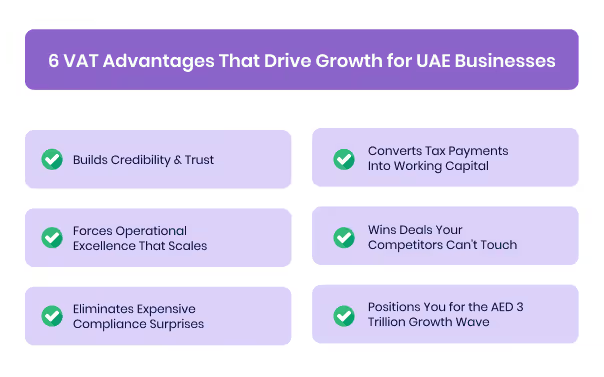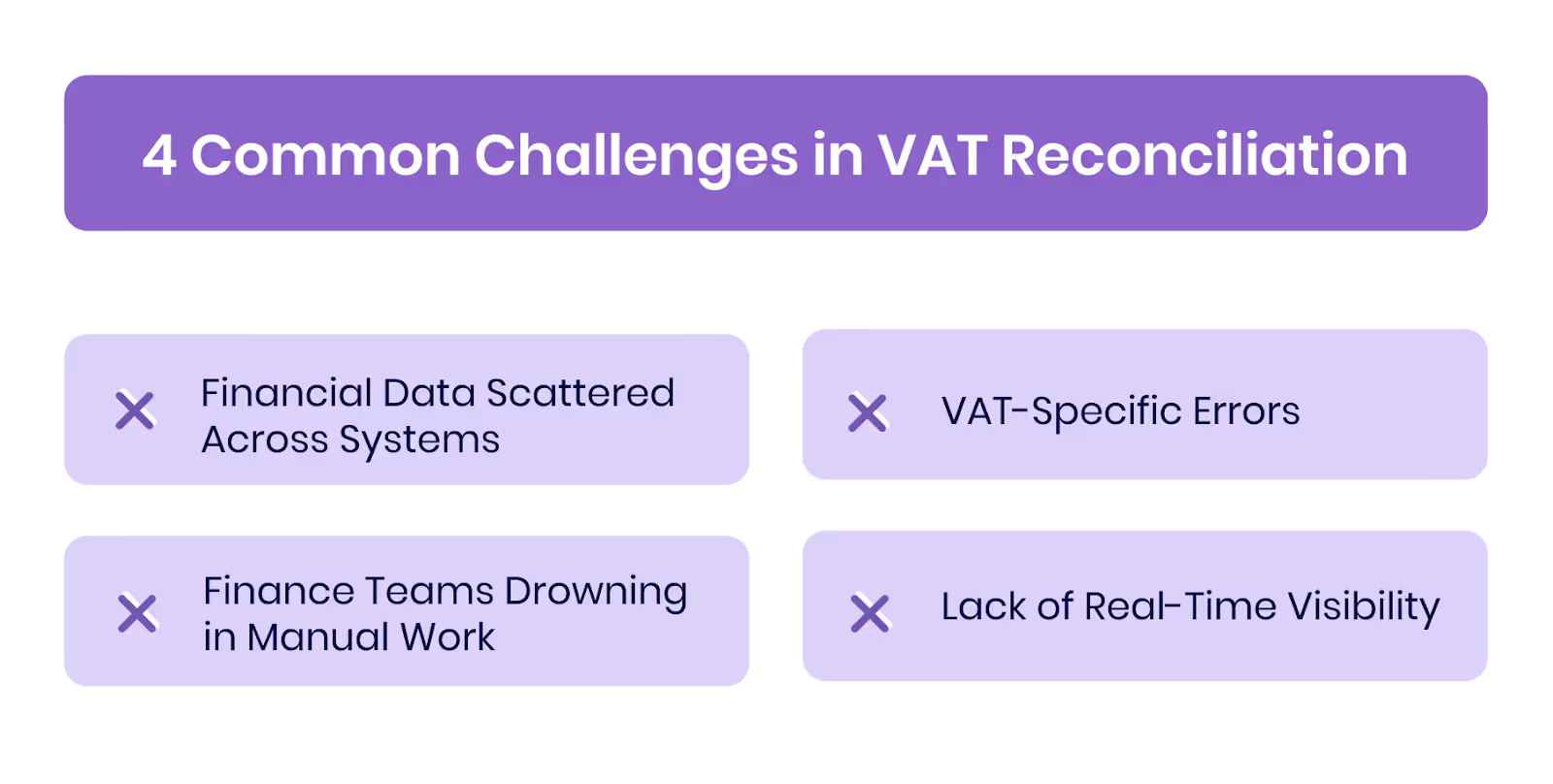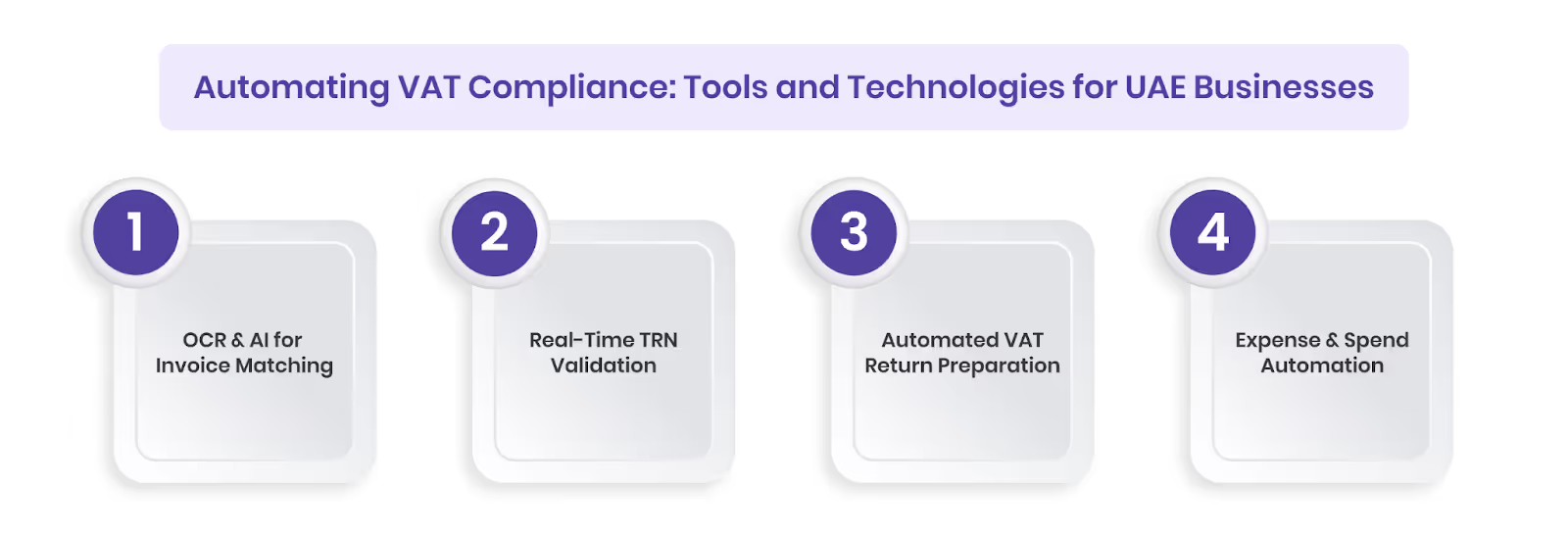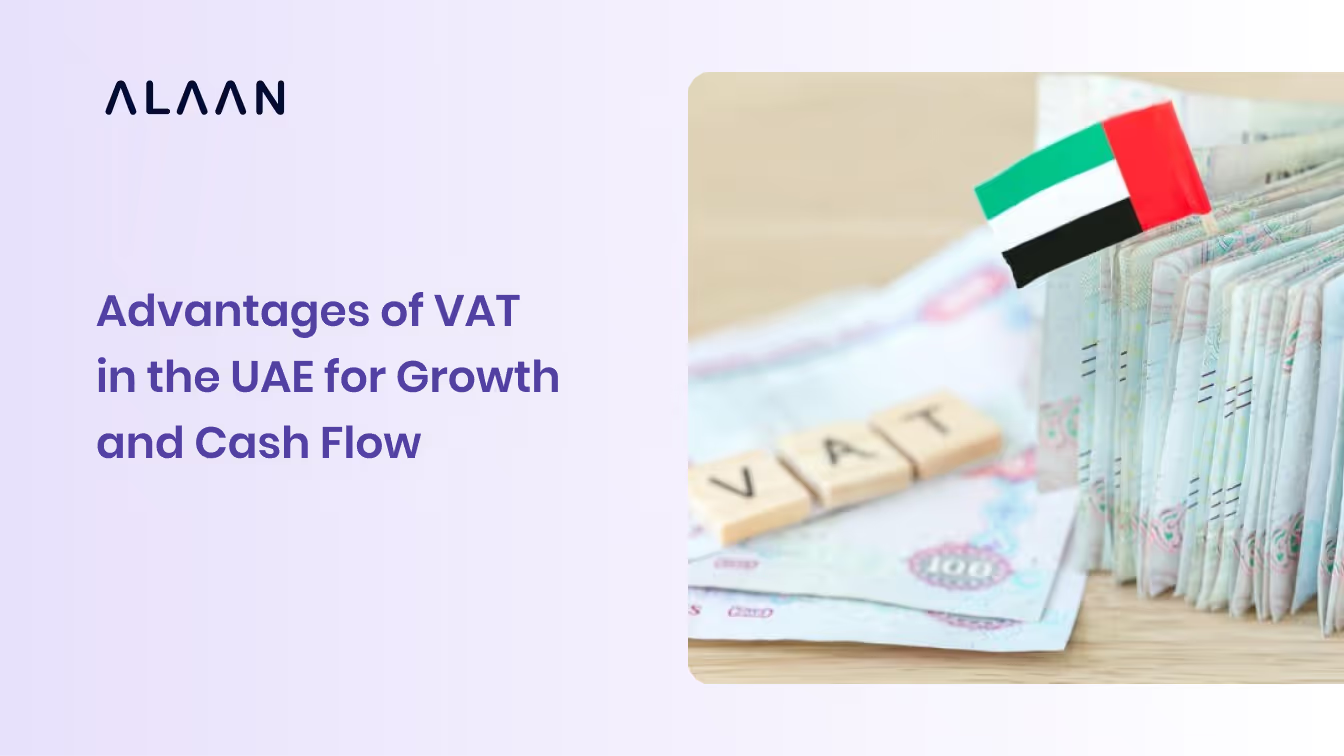Four out of five UAE CEOs expect GDP expansion in 2025, and 90% anticipate stronger revenue growth. That optimism signals opportunity, but it also raises the bar on execution. Scaling in this environment demands sharper control over capital, credibility with lenders, and cleaner reporting to regulators. VAT, often seen as a compliance formality, sits at the centre of all three.
VAT mistakes are costly. Delays in refunds, invoice mismatches, and compliance gaps lock up cash and raise regulatory risk. The challenge intensifies with multiple entities or cross-border operations, where small errors escalate quickly.
Managed well, VAT becomes a growth enabler. It frees up cash from refunds, strengthens investor confidence with clean financials, and removes friction that slows expansion, keeping capital moving and growth on track.
This blog will explain the advantages you can realise now with VAT in the UAE, the operational gaps that block them, and the automation tactics that close those gaps fast.
Key Takeaways
- VAT Builds Credibility – Compliance signals transparency, boosts investor and lender trust, and opens access to high-value contracts and government tenders.
- Enforces Operational Discipline – VAT compliance drives structured processes, digitisation, and audit-ready records, laying the foundation for scalable growth.
- Protects Cash Flow – Strategic VAT management prevents costly penalties, accelerates refunds, and converts tax payments into recoverable working capital.
- Gives Competitive Advantage – VAT registration makes procurement frictionless for B2B clients, positioning businesses ahead of non-compliant competitors.
- Automation Unlocks Efficiency – AI, OCR, and smart spend management tools eliminate manual errors, speed up reconciliations, and provide real-time visibility into VAT and expenses.
Why Smart Leaders Treat VAT as a Growth Tool
Most businesses view VAT as paperwork and penalties waiting to happen. The tracking requirements and compliance deadlines often feel like drains on resources—especially in fast-moving sectors like SaaS, e-commerce, and retail.
Growth-focused leaders take a different view. They recognise that VAT discipline, when done right, builds the financial foundation for scale. It enforces clean expense tracking, highlights inefficiencies, and produces investor-grade records that strengthen credibility. It’s why VAT registrations in the UAE rose 10% in 2024, with more companies embedding VAT into their operating models as a driver of resilience, not just compliance.
So what does strategic VAT management deliver for your business?
6 VAT Advantages That Drive Growth for UAE Businesses

VAT registration creates competitive edges that compound as you scale, impacting everything from procurement power to market credibility. Here's how strategic VAT management drives specific business outcomes that strengthen your market position.
1. Builds Credibility and Trust
Major corporations and government entities increasingly screen suppliers based on compliance standards. Without VAT registration, you're automatically excluded from high-value procurement processes, regardless of your capabilities or pricing.
VAT registration signals you operate at enterprise scale. In a global market where 150+ countries use VAT systems, VAT registration positions your business as internationally aligned and procurement-ready.
Large B2B clients view VAT-registered suppliers as lower-risk partners, opening doors to contracts that can transform your revenue trajectory. For scaling businesses, this single credential often determines whether you're invited to compete for seven or eight-figure opportunities.
2. Builds Operational Excellence That Scales
"In 2018, when the UAE entered into a formal tax regime, it remarkably transformed businesses from operating without systematic records to adopting record-based conduct in a short span of time." Kalaiarasan Manoharan, Global Tax and Compliance Lead, Noon
VAT compliance demands precision across every department, creating accountability that didn't exist before. Many businesses used VAT implementation as the catalyst to overhaul ERP systems, digitise workflows, and build audit-ready operations. What started as tax compliance became the foundation for scalable business infrastructure.
[cta-9]
The long-term payoff is significant: fewer financial errors, higher data quality, and governance structures that attract investors and partners. Companies that implemented this transformation early now operate with systematic rigour that supports rapid growth.
3. Eliminates Expensive Compliance Surprises
Non-compliance penalties in the UAE can derail growth plans overnight. Substantial fines, audit costs, and reputational damage from tax disputes create cash flow shocks that force difficult decisions like cutting marketing spend, delaying expansion, or scrambling for emergency funding.
Strategic VAT compliance acts as insurance against these risks. Accurate filing processes virtually eliminate disputes with the Federal Tax Authority, while proactive compliance systems catch issues before they become penalties. The UAE's voluntary disclosure framework rewards businesses that self-correct, turning potential crises into manageable adjustments.
The result is predictable cash flow and a protected reputation. While competitors face unexpected compliance costs that disrupt their growth trajectory, disciplined businesses maintain steady capital deployment and stakeholder confidence.
4. Converts Tax Payments Into Working Capital
Fast-growing companies face a cash flow paradox: the more you invest in expansion, the more capital gets locked in VAT payments on equipment, technology, and infrastructure. Without VAT registration, these payments disappear into compliance costs that never return.
VAT registration flips this equation. Input VAT becomes recoverable working capital, money you can reclaim and redeploy into growth initiatives. For scaling businesses making heavy upfront investments, timely VAT refunds can provide the cash injection that funds the next phase of expansion without diluting equity or increasing debt.
The operational advantage compounds over time. Streamlined refund processes free your finance team from administrative work, allowing them to focus on strategic analysis and capital allocation decisions that drive growth. What started as tax compliance became a systematic way to optimise cash flow management and accelerate expansion timelines.
To know the procedure to claim your input tax recovery, check our guide: How to Claim Input Tax Recovery Under VAT UAE.
5. Wins Deals Your Competitors Can't Touch
In B2B sales, price isn’t always the deciding factor; ease of procurement is. If your competitors are VAT-registered and you are not, clients face a dilemma: pay more or choose the supplier whose VAT they can recover.
VAT registration removes this friction. Corporate clients treat VAT as a recoverable expense, letting purchasing decisions focus on your value proposition rather than compliance headaches.
The edge is decisive in high-stakes competitions. Government tenders and enterprise RFPs increasingly list VAT registration as a baseline requirement. While non-registered competitors may be disqualified upfront, you compete on capabilities and strategy. In markets where a single contract can define your year, VAT registration often determines who gets a seat at the table.
6. Positions You for the AED 3 Trillion Growth Wave
The UAE's trade economy is booming, with non-oil trade reaching AED 3 trillion in 2024, a 14.6% increase from the previous year. This growth creates massive opportunities, but only for businesses equipped to capture them. Companies without proper VAT infrastructure find themselves locked out of the fastest-growing segments.
VAT compliance becomes your entry ticket to this expansion. International clients expect seamless cross-border transactions with compliant partners, while investors and strategic partners scrutinise tax readiness before committing capital. In due diligence processes, clean VAT records often determine whether deals move forward or stall indefinitely.
Even with VAT’s growth and cash flow advantages, companies can lose momentum if compliance gaps persist. The next challenge for leaders is identifying where reconciliation pitfalls can slow expansion and tie up capital.
4 Common Challenges in VAT Reconciliation

Although VAT has been applicable since 2018, businesses in the UAE continue to face recurring challenges when reconciling their VAT records. These challenges often stem from fragmented processes, manual workloads, and delayed visibility into financial data.
1. Financial Data Scattered Across Systems
Your finance team needs complete transaction visibility to optimise VAT recovery, but critical data sits trapped in disconnected systems. This fragmentation costs real money as 87% of businesses lack automated cash management, forcing teams to manually hunt for records instead of analysing growth opportunities.
The impact hits three ways:
- Delayed refunds: Slow reconciliation means cash stays locked in VAT recovery longer
- Missed deadlines: Manual tracking leads to missed recovery opportunities and compliance gaps
- Resource drain: Finance teams chase paperwork across departments instead of supporting expansion
2. Finance Teams Drowning in Manual Work
Your finance team spends days every month matching receipts to payments, hunting down missing invoices, and cross-checking VAT calculations across spreadsheets. This isn't just inefficient; it's expensive talent doing clerical work instead of strategic analysis that drives growth.
Manual reconciliation creates three critical problems:
- Resource waste: Senior finance professionals burn time on data entry instead of cash flow optimisation
- Error multiplication: Spreadsheet mistakes compound into compliance risks and missed recoveries
- Delayed insights: Month-end closes stretch longer, delaying financial visibility when decisions matter most
Real-time automation flips this equation entirely. For instance, Alaan helped Al Barari automate its spend management, saving over 200 hours every month that were previously lost to manual expense reviews and reconciliations. Their finance team shifted from reconciliation clerks to strategic advisors, improving both operational efficiency and compliance accuracy while accelerating financial closes.
3. VAT-Specific Errors (TRN, Input/Output VAT)
A single invalid tax registration number or miscalculated VAT amount can trigger regulatory scrutiny that costs far more than the original mistake. Even well-managed companies face audits and penalty exposure because manual validation systems miss critical details that automated checks would catch instantly.
The business impact extends beyond compliance costs:
- Cash flow disruption: Delayed refunds while authorities investigate discrepancies
- Management distraction: Senior team time diverted to regulatory responses instead of growth initiatives
- Reputational risk: Audit flags create questions with investors, partners, and major clients
Automated validation eliminates these vulnerabilities by catching errors before they reach regulators. Systems that validate tax numbers in real-time and cross-check VAT calculations against transaction data turn potential compliance disasters into routine processing, protecting both cash flow and management focus.
4. Lack of Real-Time Visibility
You can't manage what you can't see in real-time. When expense data trickles in weeks after transactions occur, your VAT position becomes a guessing game. Finance teams scramble to piece together incomplete records while regulatory deadlines approach, creating cash flow uncertainty exactly when growth demands precision.
The visibility gap creates compounding risks:
- Cash planning disruption: Unknown VAT liabilities make accurate forecasting impossible
- Audit vulnerability: Incomplete records during regulatory inspections expose penalty risk
- Decision delays: Month-end uncertainty postpones expansion investments and strategic moves
[cta-5]
Real-time transaction visibility transforms VAT from reactive compliance into proactive cash management. When every expense is captured and categorised instantly, your VAT position becomes predictable, refund timing becomes reliable, and financial planning regains the accuracy that supports confident growth decisions.
Ready to eliminate these capital drains? Leading UAE businesses are solving VAT reconciliation challenges with automated spend management that turns compliance into a competitive advantage. See how Alaan's AI-powered platform transforms VAT complexity into growth infrastructure - Book a 15-minute demo and discover why finance leaders choose automation over manual reconciliation.
Automating VAT Compliance: Tools and Technologies for UAE Businesses

The UAE is moving steadily towards a fully digital tax environment. With the Federal Tax Authority introducing e-invoicing and preparing for the upcoming eVAT system, automation is becoming indispensable. Businesses that implement the right tools now can cut compliance risks, save time, and build audit readiness into their daily workflows.
1. OCR and AI for invoice matching
Modern expense and tax platforms use Optical Character Recognition (OCR) and AI to capture data directly from invoices and receipts. Automated Invoice Processing ensures transactions are recorded with precision across your entire workflow. This eliminates manual entry and ensures transactions are recorded with precision.
- High OCR accuracy reduces input errors.
- Automatic categorisation maps seamlessly to a company’s chart of accounts.
- Matching invoices to purchase orders through an Automated Purchase Order system ensures every expense is accurately accounted for
2. Real-time TRN validation
Incorrect Tax Registration Numbers are among the most common causes of VAT filing errors. Automated tools now cross-check TRNs instantly against the FTA database, flagging discrepancies before they turn into penalties.
3. Automated VAT return preparation
VAT-ready platforms consolidate spend data and apply compliance rules to generate draft returns.
- Input and output VAT are segregated automatically.
- Cross-border transactions are reconciled under GCC VAT frameworks.
- Built-in error checks highlight anomalies before submission.
4. Expense and spend automation
Smart corporate cards and expense management systems ensure VAT records are updated in real time.
- Expenses are captured instantly, eliminating backlogs.
- Categorisation happens automatically, reducing reconciliation delays.
- Finance teams gain live dashboards showing recoverable VAT and potential risks.
By combining these features, automation platforms reduce errors, accelerate filings, and enhance transparency. In the UAE, solutions like Alaan take it a step further by integrating spend management with VAT automation, helping finance leaders stay compliant, audit-ready, and in control of every dirham spent.
[cta-4]
Also, check our UAE-focused guide on tools for automation: AI Tools and Trends in Accounting Automation.
How Alaan Simplifies VAT Compliance for UAE Businesses
Managing VAT in the UAE can be complex, with multiple receipts, invoices, and transactions across teams. Alaan’s AI-powered spend management platform helps businesses stay compliant effortlessly while reducing manual effort.
- Automated VAT Capture and Categorisation: Alaan extracts VAT details from receipts, invoices, and card transactions, automatically categorising them by standard, zero-rated, or exempt supplies. This reduces manual errors and ensures accurate VAT reporting.
- Real-Time Expense Visibility: Finance teams gain instant insights into spending and VAT charges, allowing quicker issue identification and better financial control.
- Digital Receipt Management: All receipts are stored and retrievable digitally, making audits and FTA inspections seamless.
- Accuracy and Error Reduction: Alaan automates VAT calculations, validates tax codes, and flags discrepancies, minimising risks of fines or penalties.
- Seamless Accounting Integration: VAT data syncs automatically with platforms like Xero, QuickBooks, Oracle NetSuite, and Microsoft Dynamics, supporting timely and accurate reporting.
- Customisable Spend Controls: Set card limits, vendor restrictions, and approval rules to prevent unauthorised VAT-related expenses.
- AI-Powered Automation: Alaan’s AI matches receipts with transactions, detects duplicates, and enforces policies, freeing teams to focus on strategic priorities.
Reach out to simplify VAT compliance and take control of your business finances.
Conclusion
VAT compliance can be complex, but businesses that align with regulations experience the advantages of VAT in the UAE, such as improved credibility, operational discipline, and scalable growth. Automation and modern tools can bridge the gap between regulatory requirements and practical execution, reducing errors and freeing teams for higher-value work.
If you are looking for an automation platform to streamline your spend management, Alaan provides AI-powered expense management and smart corporate cards that simplify VAT processes, improve financial control, and reduce administrative effort. Book a demo with Alaan today.
FAQs About the Advantages of VAT in the UAE
1. How does VAT compliance enhance credibility for UAE businesses?
VAT compliance signals transparency and adherence to international and local tax standards, building trust with investors, banks, customers, and business partners.
2. Can VAT help improve operational efficiency?
Yes. VAT compliance encourages structured record-keeping, automated accounting, and disciplined expense management, which streamlines financial operations and reduces errors.
3. What financial risks are mitigated by being VAT-compliant?
Businesses that follow VAT regulations avoid fines, penalties, and audit disputes, while also reducing the risk of incorrect tax filings that can affect cash flow.
4. How does VAT support business growth and scalability?
VAT-ready systems make it easier to expand across borders, work with VAT-registered suppliers, and secure funding or partnerships that require regulatory compliance.
5. Are there tools or technologies that make VAT management easier?
Spend management automation platforms like Alaan can capture receipts, calculate VAT, validate TRNs, and provide real-time expense visibility, reducing manual reconciliation and ensuring accurate filings.


.avif)







